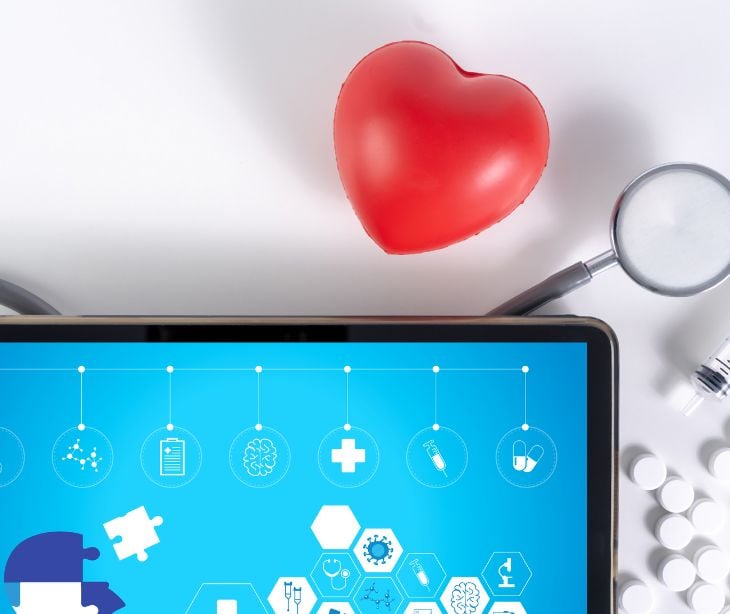5 min read
Using HIPAA compliant emails to prepare for giving birth
Tshedimoso Makhene
April 23, 2025

Expecting mothers need guidance, support, and access to reliable medical information throughout their pregnancy journey. While in-person consultations and prenatal classes are invaluable, healthcare providers can enhance maternal education and preparedness by leveraging digital communication. HIPAA compliant email platforms offer a secure, efficient, and personalized way to keep expectant mothers informed while protecting their sensitive health information.
The importance of secure communication in prenatal care
Expectant mothers receive an overwhelming amount of information throughout their pregnancy. From routine prenatal checkups to birth plans and postpartum care, the need for clear, timely, and secure communication is essential. Without clear and timely communication, they may struggle to prioritize essential information, leading to stress, misinformation, or missed medical guidance. A nationwide survey in the United States published in the JMIR Pediatrics and Parenting Journal revealed that over 75% of childbearing women searched for information related to pregnancy and childbirth on the internet. However, these resources are often scattered, conflicting, and challenging to appraise and understand, leading to potential information overload and increased anxiety among expectant mothers. A study by Leila Shahrzadi, Ali Mansouri, Mousa Alavi, and Ahmad Shabani found that “the constant bombardment of information can lead to feelings of anxiety, confusion, and even burnout.” One way to combat information overload and ensure that expectant mothers receive clear, accurate, and relevant guidance is through HIPAA compliant email communication.
Given the sensitive nature of pregnancy-related healthcare information, traditional email services may not provide the necessary security and privacy protections. However, HIPAA compliant email platforms allow healthcare providers to share personalized, evidence-based, and secure messages with patients while adhering to federal privacy regulations. HIPAA compliance ensures protected health information (PHI) remains confidential and secure when shared via email. By using HIPAA compliant email services, healthcare providers can build trust with patients while delivering critical information on:
- Prenatal care tips
- Birthing plans
- Labor and delivery expectations
- Postpartum care and mental health support
- Newborn care guidance
Secure communication helps bridge the gap between in-person visits, offering mothers ongoing support and reducing the stress associated with pregnancy.
Read also: HIPAA compliant communication for prenatal care
Best practices for using HIPAA compliant emails in maternal care
To effectively use email for prenatal communication, healthcare providers must follow best practices that ensure compliance, engagement, and clarity.
Use a HIPAA compliant email service
Standard email services such as Gmail and Outlook are not inherently HIPAA compliant. Healthcare providers must use services specifically designed to transmit PHI securely. Providers should partner with vendors that sign business associate agreements (BAAs) to ensure compliance.
One such solution is Paubox Email Suite, which offers seamless encryption for secure email communication, ensuring that all PHI remains protected without requiring patients to log into portals or use passwords.
Obtain patient consent
According to the U.S. Department of Health and Human Services (HHS), “a covered entity must obtain the individual's written authorization for any use or disclosure of protected health information that is not for treatment, payment or health care operations or otherwise permitted or required by the Privacy Rule.” Mothers should be informed about the type of information they will receive, how their data is protected, and their right to opt out of email communication at any time.
Personalize the content while protecting PHI
HIPAA compliant emails can be personalized to cater to a mother’s specific pregnancy stage without disclosing excessive PHI. For example, sending trimester-based updates, dietary tips, and reminders for prenatal checkups can be valuable without including detailed medical records.
Educate mothers on secure email practices
Patients should be educated on how to recognize secure emails from their healthcare provider and avoid phishing scams. Resources such as those provided by UC Davis Health can help expecting mothers recognize phishing scams. They help identify phishing emails by looking for generic greetings, spelling errors, and unexpected requests for personal information. Legitimate emails from healthcare providers typically include specific details and avoid urgent or threatening language.
Leverage email automation for consistency
Automated email workflows can ensure that mothers receive timely information throughout their pregnancy. For example, a hospital or OB-GYN clinic can create an email series that sends:
- A welcome email after the first prenatal visit
- Monthly educational content based on the pregnancy stage
- Pre-delivery checklists in the final trimester
- Postpartum recovery and newborn care guidance after birth
How HIPAA compliant emails enhance the birthing experience
A 2022 study by Amina Alio and colleagues, featured in the Maternal and Child Health Journal, revealed that enhancing communication between expectant mothers and healthcare providers results in improved medical birth outcomes. When patients have access to timely and clear information about their health conditions, they are more likely to adhere to medical advice, which reduces complications and boosts engagement with prenatal care services. Additionally, the CDC reported that over 80% of pregnancy-related deaths in the U.S. could be prevented; breakdowns in communication contribute significantly to this statistic. Secure digital communication can address these issues by improving patient education, promoting early intervention efforts, and ensuring continuity of care.
Building confidence through education
A study by B Sjögren of the Center for Women and Children's Health, Department of Obstetrics and Gynecology Karolinska Hospital involving 100 pregnant women referred for extreme fear of childbirth found that 73% lacked trust in obstetrical staff, 65% feared their own incompetence, and 55% were concerned about the potential death of the mother, infant, or both. Regular emails containing evidence-based information on childbirth, pain management techniques, and hospital procedures can ease their worries and empower them to make informed decisions.
Providing personalized birth plans
Birth plans help mothers communicate their preferences regarding labor, pain relief, medical interventions, and postpartum care. Featured in the Journal of Education and Health Promotion is a study by Shahnaz Kohan and her colleagues. Their research supports the effectiveness of birth plans in enhancing maternal satisfaction and empowering women.
A HIPAA compliant email platform allows providers to send mothers templates and guidance on how to create a personalized birth plan.
Read also: How to balance personalization and privacy for HIPAA compliance
Preparing for hospital admission
Hospitals and birthing centers can use email to guide mothers on pre-admission requirements, necessary documents, and what to pack for their hospital stay. Sending reminders about required lab tests or vaccination updates ensures that everything is in place for a smooth delivery experience.
Facilitating communication with healthcare providers
Secure email communication enables expecting mothers to ask non-urgent questions between appointments. According to Anne-Marie Sullivan from Paubox, secure email allows patients to communicate with their healthcare providers from home, enhancing accessibility and reducing unnecessary in-person visits.
Supporting postpartum recovery
According to Cleveland Clinic, “Major body and life changes are happening at the same time during the postpartum period. Some changes are physical — for example, breast engorgement and vaginal bleeding. Other changes occur due to changing hormones.” During this time, HIPAA compliant emails can be used to support new mothers by providing postpartum care instructions, breastfeeding tips, mental health resources, and newborn care checklists.
Read also: Improving maternal and infant health outcomes with HIPAA compliant email
Choose Paubox Email Suite for secure maternal communication
Paubox Email Suite is an ideal solution for healthcare providers looking to enhance maternal care through secure, HIPAA compliant communication. Unlike traditional email services like Gmail or Outlook, which are not inherently HIPAA compliant, Paubox encrypts every email automatically, ensuring that protected health information (PHI) remains secure. Seamless encryption means expectant mothers can receive critical pregnancy-related information directly in their inboxes without needing to log into a separate portal or remember complex passwords, thus making the experience both convenient and safe.
With Paubox Email Suite, healthcare providers can establish trust with their patients by delivering essential guidance at each stage of pregnancy. Whether sending trimester-based educational content, personalized birthing plans, or postpartum recovery resources, providers can ensure their messages reach mothers securely and without risk of exposure to unauthorized parties. Additionally, Paubox offers business associate agreements (BAAs), a requirement for HIPAA compliance, giving healthcare organizations confidence that their patient communications adhere to federal regulations.
By integrating Paubox into their maternal care programs, hospitals, OB-GYN clinics, and midwifery practices can automate secure email workflows, reducing administrative burden while improving patient engagement. From appointment reminders to mental health resources, Paubox enables healthcare providers to maintain clear and consistent communication, empowering mothers to make informed decisions about their pregnancy and childbirth. Investing in a secure email solution like Paubox not only protects patient privacy but also enhances the overall prenatal and postpartum experience.
FAQS
Why is HIPAA compliance important for pregnancy-related emails?
HIPAA compliance ensures that sensitive patient information, such as medical history, prenatal care details, and birthing plans, remains secure. Using a HIPAA compliant email service prevents unauthorized access and protects patient privacy.
What kind of information can be sent through HIPAA compliant emails?
Healthcare providers can send:
- Prenatal care guidelines
- Birthing plan templates
- Appointment reminders
- Hospital admission instructions
- Postpartum recovery resources
- Newborn care tips
Can expectant mothers opt out of receiving emails?
Yes, providers should always obtain patient consent before sending emails and offer an easy way to opt out at any time.
Subscribe to Paubox Weekly
Every Friday we bring you the most important news from Paubox. Our aim is to make you smarter, faster.




